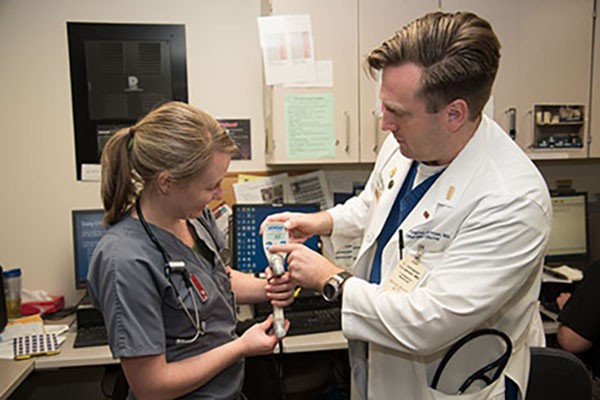Washington People: Chris Carpenter
Watching his grandparents struggle at the end of their long lives hasmotivated Chris Carpenter, MD, an associate professor of emergency medicine at Washington University School of Medicine, to work countless hours to improve emergency room care for older adults and to help create a new medical subspecialty — geriatric emergency medicine.
Regional conference will focus on out-of-hospital medicine
Faculty in the Division of Emergency Medicine are hosting a regional conference on out-of-hospital medicine from 8 a.m. to 5 p.m. Thursday and Friday, Oct. 23 and 24, at the Renaissance Grand Hotel in St. Louis. Out-of-hospital medicine refers to treatment provided by emergency medical services (EMS) that operate under the supervision of physicians.
Carpenter helped develop guidelines to improve older adult care in emergency departments
Chris Carpenter, MD, associate professor of emergency medicine, co-chaired the national Geriatric Emergency Department Guidelines Task Force, which created new recommendations intended to improve the care for older adults in emergency departments.
Mullins teaches emergency medicine in Bolivia
Michael Mullins, MD, associate professor of emergency medicine at the School of Medicine, recently shared his expertise with doctors, nurses and paramedics in Bolivia. He and other U.S. health-care workers trained Bolivians through Project Helping Hands, an organization that provides health care and education to people in developing countries. Shown is a roomful of paramedics who sought the training.
Emergency medicine offers new fellowship
The Division of Emergency Medicine is offering a
two-year fellowship designed to allow emergency medicine trainees and
others interested in clinical, translational or basic research careers
to develop the skills to become successful, independent investigators. The program, which is coordinated through the
Clinical Research Training Center, culminates in a master’s degree of
science in clinical investigation.
Washington People: Brent Ruoff
Brent Ruoff’s quick thinking and calm demeanor have likely saved his own life in the wilderness, and he draws on these same skills when diagnosing and caring for patients who arrive with shattered bones, gunshot wounds or head injuries.
Fireworks safety? Theres no such thing says emergency medicine specialist
Medical experts suggest leaving fireworks to professionals.Fireworks can be beautiful against the night sky on July 4th, but a Washington University emergency medicine specialist at St. Louis Children’s Hospital says, for safety’s sake, parents and children should leave the fireworks to professionals. All fireworks are dangerous, especially to children. Typically, about two-thirds of all fireworks injuries occur in the days around the July 4th holiday.
Fireworks safety? Theres no such thing says emergency medicine specialist
Medical experts suggest leaving fireworks to professionals.Fireworks can be beautiful against the night sky on July 4th, but a Washington University emergency medicine specialist at St. Louis Children’s Hospital says, for safety’s sake, parents and children should leave the fireworks to professionals. All fireworks are dangerous, especially to children. Typically, about two-thirds of all fireworks injuries occur in the days around the July 4th holiday.
Researchers find new generation of artificial turf isnt any softer
Heather Parrott and Jay Webb measure accelerations on a frozen field.This month, more than 130 million people will tune their televisions to football’s biggest event, the Super Bowl. It’s not certain which team will win, but it’s a good bet that someone may be injured. In fact, injuries are common to football at every level. In recent years, the sport has focused on playing fields as a significant source of injury, and new surfaces have been developed. But are the new surfaces safer? Emergency medicine researchers at the School of Medicine have found that in terms of concussion risk, the new fields are no safer, and they may get worse over time.
Researchers find new generation of artificial turf isnt any softer
Heather Parrott and Jay Webb measure accelerations on a frozen field.This month, more than 130 million people will tune their televisions to football’s biggest event, the Super Bowl. It’s not certain which team will win, but it’s a good bet that someone may be injured. In fact, injuries are common to football at every level. In recent years, the sport has focused on playing fields as a significant source of injury, and new surfaces have been developed. But are the new surfaces safer? Emergency medicine researchers at the School of Medicine have found that in terms of concussion risk, the new fields are no safer, and they may get worse over time.
View More Stories

